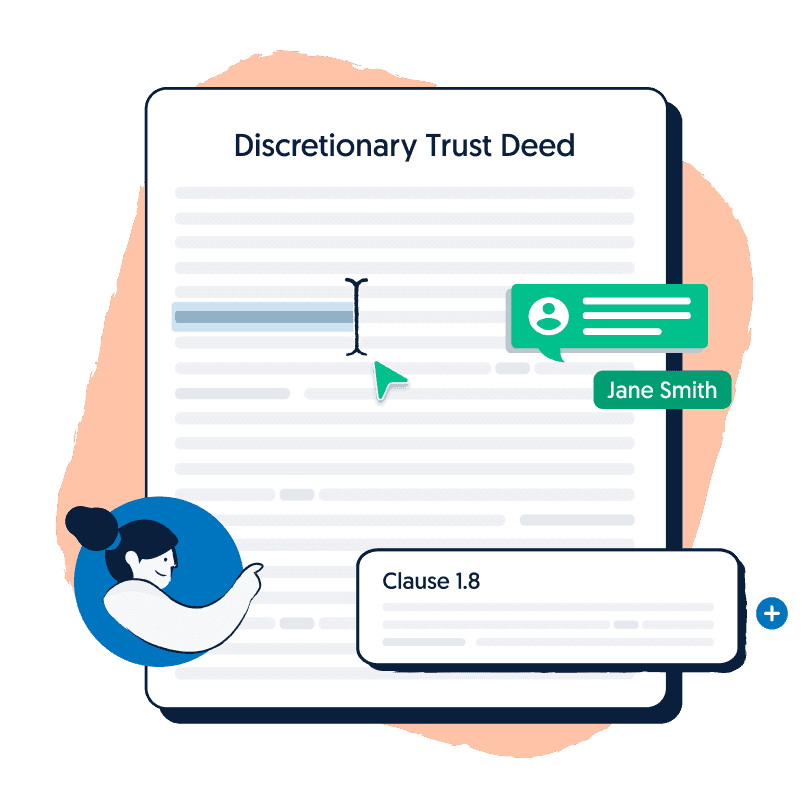There are many principles, obligations, and rules involved in trust law. Trust law can be complicated to follow, and it can be particularly difficult to determine what a trustee can and can’t do. A common question that is asked in regard to trusts is, ‘can a trustee be a beneficiary of a discretionary trust’.
In this article, we’ll explain whether a trustee can be a beneficiary of a discretionary trust, how to safeguard a trust and answers to other frequently asked questions.
Read along!
Can a trustee be a beneficiary of a discretionary trust?
The short answer to this question is yes. Trustees can be a beneficiary of a discretionary trust.
However, it’s important to note that although the law doesn’t prohibit a trustee of a discretionary trust from being a beneficiary of the trust, there are several potential issues that a settlor must recognise when setting up a discretionary trust (also known as a ‘family trust’).
If you want to get started on creating a discretionary trust, you should use our discretionary trust deed template to get started.
Understanding a trust
Essentially, setting up a trust is a process that separates the interests in a trust property into separate parts. The legal interest will be vested by the trustee, and the equitable interest will be vested in the beneficiary. The trustee will then be legally entitled to manage the trust property, and the beneficiary enjoys the benefits of the trust.
Therefore, a trustee can only be the beneficiary of a trust if there is more than one trustee or one beneficiary. Otherwise, the individual will be the absolute owner of the trust if they hold both the full legal and equitable interest in the trust property.
Potential beneficiaries of a discretionary trust do not have interest in the trust
Unlike a fixed trust, a discretionary trust is created through a discretionary trust deed. A discretionary trust deed is a formal document that outlines how the trust operates and what the trustee is permitted to do in relation to the discretionary trust. In a discretionary trust, the trustee is provided with the ability to exercise discretionary power when they are choosing to distribute capital or income of the discretionary trust.
A trustee can choose to select the beneficiaries from a nominated class of potential beneficiaries. As a result, until a beneficiary is selected from a class of beneficiaries, they don’t hold any trust property. Therefore, beneficiaries of discretionary trusts are not entitled to a fixed entitlement to the trust funds.
In the case of a discretionary trust, there is no guarantee that an individual will be picked from the class to be the beneficiary of the trust. Therefore, even if the beneficiary is included in the nominated class, there is no presumption that they will be chosen by the trustee. However, it’s important to note that the trustee is still obligated to act fiducially and comply with the duties they have as a trustee.
Ultimately, trustees are given total discretion in regard to the distribution of the trust, and they’re only limited by the obligations that apply to them in the trust deed.

Get your Discretionary Trust Deed for free.
You can use this Discretionary Trust Deed to establish a discretionary trust in any state/territory in Australia.
What should you do to safeguard your trust
Trustee duties
One way to safeguard your trust is to ensure your trust’s trustee is complying with the duties of a trustee. The duties a trustee have include the following:
- Trustees are required to act impartially and gratuitously when exercising the discretionary power of the trustee
- Discretionary trust trustees must not choose themselves as a beneficiary or grant themselves any benefit for a personal reason to gain profit
- Trustees are also required to consider every beneficiary equally and impartially
- Trustees are required to act in good faith and with honesty
- Trustees are required to comply with trust terms
- Trustees aren’t allowed to assign their own responsibilities to others unless it’s permitted under the trust deed
- Trustees need to accurately maintain trust records and keep beneficiaries informed
- Trustees are required to be impartial in their treatment of beneficiaries and different classes of beneficiaries
- Trustees must act in the best interest of both present and future beneficiaries
Having more than one trustee and beneficiary
While it is presumed that the trustee will act genuinely in accordance to their fiduciary duties, a settlor is always advised to appoint more than one trustee if they would like a trustee to also be in the nominated class. A settlor can always appoint more than one trustee when setting up a trust, which is an effective way to avoid the improper exercise of the discretionary power of the trust under the sole discretion of a single trustee.
On the other hand, a settlor may also indicate the number of beneficiaries to be selected and other criteria to limit the discretion of the trustee. This may help to avoid the potential risk that the trustee takes away the entire trust properties under their sole discretion.
Frequently Asked Questions(FAQs)
Can a trustee be the sole beneficiary of a discretionary trust?
Although a trustee can be a beneficiary of a discretionary trust, they can’t be the sole beneficiary unless the trust has more than one trustee.
Who can be a trustee of a discretionary trust?
The trustee of a beneficiary can be any of the following:
- A company
- A trustee of a different trust
- An individual
What is the liability of the trustee of a discretionary trust?
Trustees have liability under both tax law and trust law. The liability trustees have in accordance with trust law includes the following:
- Under trust law a trustee can be held personally liable for trust debts in relation to the trusts they are responsible for
- Trustees have the right to receive indemnification from trust property for liabilities they incur when they are exercising their trustee powers properly. However, trustees don’t have this right if there has been a breach of the trust
The liability trustees have under tax law include the following:
- Trustees are liable for the management of the tax affairs of the trust
- Trustees are responsible for the registration of the trust in the tax system
- Trustees are responsible for the lodgement of tax returns
- Trustees are responsible for the payment of certain tax liabilities
How does a beneficiary get money from a trust?
In a discretionary trust, beneficaries get money from the trust if the trustee chooses to distribute capital or income to them from the discretionary trust. This income or capital can be provided to beneficiaries through several ways such as through the beneficiary’s bank account.
Conclusion
Ultimately, a trustee can be a beneficiary of a discretionary trust. It’s not unusual for trustees to be beneficiaries of discretionary trusts. However, it can be argued that it’s arguably not the best option for a discretionary trust as it may introduce potential conflicts and risks to the trust.
If you’re still feeling unsure whether your trustee should be a beneficiary of your discretionary trust or you’re unsure on how to set up a discretionary trust, you should hire a lawyer. A lawyer can assist you in properly setting up your trust to avoid complications down the road.

Get a fixed-fee quote from Australia's largest lawyer marketplace.






